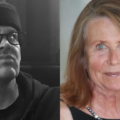Conversations: John Hennessy, Ostap Kin & Serhiy Zhadan

This is a wide-ranging and somewhat unusual conversation, weaving in the voices of three authors across two languages, touching upon poetics and politics, the war in Ukraine, the global pandemic, and much more.
John Hennessy and Ostap Kin are co-translators of A New Orthography, selected poems by Serhiy Zhadan (2020), as well as recipients of the John Frederick Nims Memorial Prize for Translation from Poetry magazine for work that appears in that volume.
Hennessy is the author of two poetry collections, Bridge and Tunnel and Coney Island Pilgrims. A former Amy Clampitt Resident Fellow, Hennessy is the poetry editor of The Common as well as the director of undergraduate creative writing at the University of Massachusetts, Amherst.
Kin edited the anthology New York Elegies, winner of the American Association for Ukrainian Studies Prize for Best Translation, and is the co-translator, with Vitaly Chernetsky, of Yuri Andrukhovych’s Songs for a Dead Rooster. His translations have appeared in Poetry, Massachusetts Review, Modern Poetry in Translation, Asymptote, and elsewhere.
Serhiy Zhadan is one of Eastern Europe’s leading literary figures and widely recognized as the voice of post-Soviet Ukraine. His work has been translated into a dozen languages. He has received the 2015 Angelus Central European Literary Award (Poland), the 2014 Jan Michalski Prize for Literature (Switzerland), the 2009 Joseph Conrad-Korzeniowski Literary Award (Ukraine), the 2006 Hubert Burda Prize for young Eastern European poets (Austria), and the BBC Ukrainian Book of the Year award in 2006, 2010, and 2014. Zhadan lives in Kharkiv.
Ostap Kin: John, I would like to start off our conversation with a few words about Serhiy Zhadan’s collection A New Orthography, which you and I translated, and which was published by Lost Horse Press as volume five of their Contemporary Ukrainian Poetry Series.
For this book, we selected poems from Serhiy’s latest three collections, meaning this is poetry written after the year 2014—the year the Russo-Ukrainian war began.
First of all, I would like to point out two things that are common, it seems to me, in those poems and for his poetry in general. Zhadan is always really inventive in terms of form and the stylistic outlook of these poems—he endlessly and persistently provides new ways to formally present a poem. And he is constantly working to depict a mosaic of the present-day impulses within a society—whether it was in the period between the 1990s until 2014, or after the Russo-Ukrainian conflict started.
In this regard, I would like to ask you: what do you, an American poet, find in Zhadan’s poetry that immediately speaks to you?
John Hennessy: This is a good question. Foremost I admire the ways in which Zhadan avoids the confessional—even, in some regards, the personal—in the poems in A New Orthography. His voice is spectacularly powerful, original, and consistent, if that’s not reductive, so you’d recognize his work anywhere. I mean this about his novels as well as his poems—his presence is always strong.
In this regard I feel like Zhadan has followed Flaubert’s dictate (even more than Flaubert ever did) that the writer be everywhere present but nowhere visible. Gustave said this as an admonition against “authorial intrusions” in fiction, which were very popular in the mid-nineteenth century, but I’m sure he’d nod appreciatively over Serhiy’s poems, too.
Zhadan’s balance between his presence and the vivid evocation of other people—that’s what this American poet notices and appreciates first.
Also, he always writes about something that matters. He can be funny, ironic, caustic, even tender, but he is always full of empathy and his characters, subjects, poems in general, always feel important. You don’t ever ask yourself, Did this need to be written?
I may as well mention here that I admire Serhiy’s fiction very much, too, and Voroshilovgrad is among my favorite novels. Serhiy has said that all of his work is “one continuous text”—and we address this in our introduction to the book. So, we might wonder, then, what guides him when he chooses genres? Apparently “character” is central to this decision, as Olena Jennings notes in “The Work of Serhiy Zhadan and the War in Ukraine”:
“In a SoHo event that featured an interview between Keith Gessen of N + 1 and Serhiy Zhadan, Gessen asked Zhadan how he decides whether to write a novel or write a poem. Zhadan said that if the character’s story is revealed to him, he will write a novel, but if it is only a glimpse at the character’s life, he finds it more appropriate for a poem.”
I love that he begins with character, even in poetry, and that’s something else that appeals to this American poet.
Zhadan’s voice is spectacularly powerful, original, and consistent, if that’s not reductive, so you’d recognize his work anywhere.
JH: Ostap, can you tell us how you got into translating in general, poetry in particular?
OK: As with many things in life, the whole thing with getting into translating happened by accident. I had a rather spontaneous need, or maybe willingness, to see how a text that looks appealing to me would sound and work in a different language—in that case, it was a Kurt Vonnegut short story, which I rendered, or tried to render, into Ukrainian, my mother tongue. Afterwards, there were other texts in multiple genres that I translated from different languages into Ukrainian.
After switching continents, I thought it would have been interesting and challenging to see if it’s possible to reproduce some samples of (mostly contemporary) Ukrainian poetry in English, my adopted language. Since then, I have been translating mostly poetry from Ukrainian, but also occasionally from Russian, into English.
Andriy Bondar, a Ukrainian poet, essayist, and translator, once said that poetry is the closest, the most attentive way of reading. I find it a fairly nuanced description of the whole process. I appreciate translating for this possibility of constantly jumping over the frontiers of language; while translating you work with the language so it can absorb and convey all the reality and details, all these combinations of metaphors and images—basically, everything that constitutes the real mosaic of an original text.
I would like to also pose a similar question—what was your motive for getting into translating?
JH: In the late 80s I lived as a squatter in Amsterdam and worked a series of odd jobs, from washing dishes in an Italian restaurant to serving as the sole model for a semester-long life-drawing course. I also gave English lessons, but I kept making friends with my students and eventually always felt bad taking money from them.
Through my ad for these English lessons, Ronald Cohen, a great translator of American fiction, found and hired me to help him with his translation of Harold Brodkey’s vast collection, Stories in an Almost Classical Mode.
Now, my Dutch was ruder than rudimentary, so that isn’t what Ronald wanted from me. His practice was to get his Dutch translation down to the final polish, and then to pepper me with a series of questions about all the possible nuances of a word, phrase, idiom, image, paragraph, etc.
After a while, I realized that mostly I was helping him figure out what was most important from the original text. If any nuance had to be sacrificed, we would “argue” out which was least important. Sometimes I felt like a literary henchman, choosing a particular implication or suggestion to eliminate.
It was an excellent lesson or practice for a young writer—or critic, too. It may also have helped in my own revision process, no matter what I might be working on.
Ronald was relentless in his pursuit of understanding the original text and in preserving as much of it as possible. He taught me about having high standards in translation in particular, but in other parts of life as well.
For example, when I mentioned that I was going to Belfast for a month-long visit to my partner at the time and couldn’t meet with him, Ronald scoffed. “That’s absurd, John. I don’t believe in this relationship you’re conducting across international borders. I don’t believe in long-distance relationships. Two people must share each other’s tedium.”
He went on to declare that once I left the Netherlands he and I would no longer be in touch. He didn’t believe in long-distance friendships, either, apparently. However, as a postscript, he did contact me years later, and we worked together long distance, via email, on a couple of books. One experience was very enjoyable, a story collection by James Salter. The other, Brief Interviews with Hideous Men, by David Foster Wallace, was not. By the end of the DFW correspondence, we were both deeply sick of that book.
I feel now that working with Ronald trained me in many ways to work with you, Ostap! Your standards are also high—but thankfully you haven’t chosen to mentor me on life through dramatic pronouncements. (Laughing)
We can talk about how we met, and started to work together, but first I’d like to ask an obvious question: Why do you translate Zhadan?
OK: There are a few things that, in my mind, are crucial in regard to Zhadan’s writing. Serhiy has managed to create a language—and continues to cultivate it—that transmits in a very understandable way not only all these contemporary issues, but also neglected, forgotten, or omitted riddles of the past. At the same time it poses necessary questions to work with those things in the future.
He also works with a wide array of poetic traditions, which flourished in Ukrainian literature at different times. The visible futurist dynamism of the 1920s and 1930s is nested in his writing, and that period is often hailed as a burgeoning time of innovative and radical shifts in Ukrainian-language writing. Then there is the second tide of Soviet modernism mixed up with modernism crafted by emigre writers living outside the Soviet Ukraine; namely, in the United States.
Around 2015 I translated a selection of his poems for a reading held at Hampshire College. Some of those poems later appeared in The Common and after that publication, I suppose, you and I started talking about the possibility of co-translating a volume of his selected poems.
What were your impressions of Serhiy’s poetry when you read it for the first time and now? What do you think of his prose in relation to his poetry?
JH: My first impressions were all positive. I felt a real enthusiasm for his work as an editor, for one thing, and I immediately knew that we were going to publish your translations. The only question was, how many of those poems could we publish in The Common. We solved that by publishing “Thirty Two Days without Alcohol” and “The Women” in the print journal and by doing a single-author online feature. Polina Barskova wrote an excellent introduction to that.
There was an immediate engagement for me personally, on a scale I have felt only occasionally, such as with Vievee Francis, Ishion Hutchinson, and Lawrence Joseph. Something about Serhiy’s tone felt deeply familiar to me and simultaneously unique. I can say this about his prose and his poetry.
As much as I love and admire his poems, one of the most enjoyable reading experiences I’ve had in the last five years was spending a couple of weeks with Voroshilovgrad. As I got near the ending, I would ration out pages to myself to make the book last longer. In fact, I’ve taken it out lately and will most likely re-read it this summer. It’s here in my living room, just waiting.
Do you have any ambition or drive to translate prose?
OK: I have the ambition but it requires a totally different approach than poetry does. I am openly envious of those translators who translate prose. There is a completely different rhythm and pace you succumb to. How do you think an American reader/poet can benefit from reading Serihy’s poetry?
JH: Any reader, American or not, can benefit from reading Serhiy because they will enjoy it, if they have any heart at all. They may even see some of their own life reflected there, if that’s what they’re after, because he writes about the whole gamut of human experience.
Also, the poems that we translated were all written since the beginning of the war, and they feel especially resonant during this time of crisis in the United States—in regards to the pandemic as well as the civil unrest.
By civil unrest, I mean specifically the violent response from the government and its agencies (the police, especially) to the peaceful protests going on across the country, the vicious attacks on people marching in support of Black Lives Matter. Civil unrest sounds like a euphemism, so pardon me.
Here are a couple of examples of particularly relevant poems published in the New Statesman, Washington Square Review, Massachusetts Review, and Poetry.
OK: Does the process of working on a translation differ from the process of working on your own poetry?
JH: The process is very different. When we translate, I have you to bounce every question off, and we are trying to render something that already exists. It’s very reassuring to work with you—and sometimes I will ask you the same question several times, spread out over hours, days, or weeks.
Regarding my own work, when I compose a poem its possibilities are virtually limitless. Rather, it’s limited only by my own imagination and vocabulary.
Editor’s note: Serhiy Zhadan enters the conversation here.
JH: Serhiy, this question has a couple of parts. We don’t want to make the potentially offensive suggestion that the war and the quarantine are the same, but we do wonder if you note any consistencies—and contrasts—between the way people are responding to the pandemic and the war.
Serhiy Zhadan: The thing is that the war in Ukraine has not been declared. That is, you can ignore it if you wish. It could have been ignored in 2014. It can be ignored now. Many actually do ignore it. Quarantine can’t be ignored—you would stand trial for ignoring it.
But the point, of course, is not in these legal formalities. The pandemic has really shown how much for everybody here in Ukraine (and, I suppose, not only in Ukraine) the personal is more important than the communal. A person will care about their health and the health of their relatives more seriously than the independence of their country and the freedom of their compatriots.
The war and the pandemic are very distant things from one another, in my opinion. I wouldn’t compare them.
The pandemic has shown our vulnerability and helplessness. For me, this is the main lesson of the pandemic.
JH: How is the pandemic affecting Ukraine in general? How is it affecting your family and friends—and your work—in particular?
SZ: The pandemic has shown our vulnerability and helplessness. For me, this is the main lesson of the pandemic.
JH: How has this time of self-quarantine changed your day-to-day life?
SZ: Well, for a month and a half I honestly stayed in the quarantine and encouraged others to do so as well, to relieve the health care system, to help the doctors. Many of my friends, who are in that layer of socially active Ukrainians, did the same.
After a month and a half, I allowed myself to leave Kharkiv for the first time. In a medical mask, of course. I didn’t like this last month and a half. It was a forced pause. I don’t like when I’m deprived of the ability to choose for myself.
JH: Has it hampered your travel to the Donbas and your work there?
SZ: Well, of course, there was a pause.
JH: Could you talk a little about the humanitarian work that you do in Donbas, as well as your readings there?
Editor’s note: Since 2014, the Donbas region of Eastern Ukraine has been a primary stage for the violent conflict between Russian-backed separatist forces and the Ukrainian government.
SZ: This winter we did a big project for children of Donbas called Read/Write. We asked children to write reviews of books they read and collected about 300 works. That was the last serious initiative we managed to implement before the quarantine. We will plan something for the fall.
In the meantime, my friend-volunteers and I regularly travel to Donbas to bring supplies, closer to the front line. I’m planning to go there for a couple of days next week.
As for readings, they’re different. The last reading was a few weeks ago for our Marines. We were visiting the unit, and the commander said, since you’re already here, read something for the soldiers. OK, I said, just don’t herd them together. Let those who are interested come. I read something.
JH: After all of this time, how is the morale of the people and the soldiers in Donbas?
SZ: For most of them, communication is important, the chance to talk with like-minded people, the understanding that they have not been forgotten, that they’re supported.
OK: Typically, your poetry collections include both rhymed poems and verse libre, and, traditionally, they employ different techniques—i.e., the form of poems is different. You seem to maneuver from one type of form to another and then come back to the initial one. Could you talk more about the importance of form for your poems?
SZ: Well, this is a completely different tradition, respectively, completely different stylistic and semantic tasks. This is such a conscious division.
It seems to me that rhymed syllabotonic poetry is something too deeply rooted in the context of Ukrainian modernism. That is, something quite internal, something that can’t completely be perceived beyond the frontiers of the Ukrainian language. This is also a conscious position—to continue writing rhymed poems in Ukrainian.
OK: American poetry has drifted away from sound (from rhymes, for example).
SZ: Rather, “academic,” bookish, “serious” poetry. Slam, hip-hop, sung poetry, recited poetry, performance poetry in most cases still remains rhymed.
OK: Rhyme, and other sound-related features of poems, remains a vitally important element in Slavic poetry (Ukrainian, Polish or Russian).
SZ: Ukrainian, Russian, and Belorusian, yes.
OK: What do you think about your poetry, especially rhymed poetry, which is being translated into other languages without preserving this feature?
SZ: It’s like translating crossword puzzles. It doesn’t make much sense it seems to me.
OK: Could you talk about the structures of your collection of poems—what you include in the end, and what you don’t? Has the way you compiled your collections changed over the years?
SZ: The last few books are written by the principle of a diary—this is a fixation of emotions and states. There, if you wish, you can trace when exactly this or that poem was written—in winter, summer or fall. The structure emerges from life itself. Something is written and later cut from the book, something is being written and added specifically. But in general, curiously enough, this principle of a diary structurally for me is the most appropriate and justified.
OK: Would you describe the poetry you write as political?
SZ: Some poems, no doubt. Political poetry raises political questions. And it’s part of political discourse. This is how it seems to me. That is, even Celan’s hermetic lyrics read at a rally or published in the party press acquire the features of political poetry.
The thing is that the very concept of politics is too broad and abstract to try to define it in one or two sentences. The same probably applies to poetry.
JH: Perhaps with some measure of irony you insist in the preface you wrote to A New Orthography that you “will consciously try not to talk about geopolitics.” However, we’re wondering if you would like to say anything about geopolitics now. If we had met in April in New York (your events there, like everything else, were canceled), no doubt our conversation would have turned to geopolitics.
For example, what would you ask of the international community (if such a thing exists, humor me) in regard to ending the war in Ukraine? And beyond that, after that, what kind of specific support might you ask from that community?
SZ: I would call on all people of good will to continue sanctions against Putin’s Russia. I don’t know, to be honest, what else the international community is capable of. In this case, my poems would sound exactly like political poems.
JH: Are there any contemporary American poets that you read? Contemporary Anglophone poets in general? And, finally, are there Anglophone poets from any era you continue to go back to? (You’ve translated Bukowski and Walcott, which indicates a varied and wide taste in Anglophone poetry that we appreciate.)
SZ: I read. Not the contemporary ones but the ones who were modern a couple of decades ago. Bukowski or Ginsberg, for example. But when something catches my eye, I try to read. I have great love for Bob Holman. He’s such a good spirit of New York poetry.
JH: Are there any contemporary Ukrainian poets that you would recommend to your own readers in other countries? Maybe a poet whose work should be translated—or translated further—into English? (They don’t have to be contemporary poets, per se.)
SZ: Vasyl Holoborodko, Oleh Lysheha, Mykola Vorobiov, Hrytsko Chubai, Taras Melnychuk. And dozens and dozens of other beautiful poets that write in Ukrainian.





